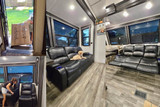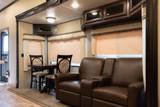The Cold Truth About RV Refrigerators
The ability to bring a fully-stocked fridge with you on your travels is a fantastic convenience afforded through RV travel. Refrigeration is not a simple process; modifications are typically made, so refrigerators are better equipped for travel. In this article, we will discuss the different refrigeration processes, then examine the different types of RV refrigerators available to better understand what fridge is best suited for your needs.
Refrigeration Processes Explained
There are 2 different types of refrigerators that are typically used in RVs: compressor refrigerators and absorption refrigerators. Both work to keep your food cool, but they do so differently. Absorption refrigerators used to be the standard for RVs, but compressor refrigerators have become increasingly popular. There are pros and cons to each type of refrigeration, but before addressing those, we should cover the two general processes.
Compressor Refrigeration Process
 Compressor refrigerators use a closed-loop cooling system that involves the mechanical compression of refrigerant liquid to facilitate heat transfer out of the fridge. This general process is known as vapor compression refrigeration (VCRS) and is the same process used in air conditioning.
Compressor refrigerators use a closed-loop cooling system that involves the mechanical compression of refrigerant liquid to facilitate heat transfer out of the fridge. This general process is known as vapor compression refrigeration (VCRS) and is the same process used in air conditioning.
VCRS is a 4-step cycle consisting of the following phases: compression, condensation, expansion, and evaporation. During the compression phase, high pressure is applied to the refrigerant liquid as it passes through, which causes the temperature to rise substantially. Next, the now high-temperature refrigerant travels through the condenser coils, which are cold and thus pull heat energy out of the refrigerant. Like all forms of energy, heat wants to travel from areas of high concentration to areas of low concentration to reach an equal state. Manipulating the pressure of the refrigerant gas within a closed system allows for the control of heat transfer out of your space. The expansion phase helps control refrigerant flow through the system and preps the coolant for the evaporator phase. In the evaporation phase, a fan blows over the cool coils to add cooled air back into the system. The cycle then starts over again.
Absorption Refrigeration Process
The absorption refrigeration process shares many similarities with the vapor compression refrigeration cycle but has a few distinct differences. The first main difference is the energy/power source for each system. Absorption refrigeration uses heat energy to power the cooling process, whereas compression refrigeration uses mechanical force powered by electrical energy. Most RV absorption refrigerators will use a mixture of ammonia and water heated by propane flame to control the reaction conditions necessary for cooling. Since a motor-powered compressor does not facilitate the heat transfer, absorption refrigerators are practically silent when running.

The other significant difference between vapor-absorption and vapor-compression refrigeration is the refrigerant flow through the system. Absorption refrigeration removes the compression phase from the VCRS cycle and replaces it with an absorption and heat generation phase.
An absorber holds the refrigerant mixture and recaptures it so the cycle may continuously flow. The generator is the part that is heated to facilitate heat transfer out of the system. You can tell if a refrigerator is an absorption unit if there are fins on the inside. These fins help to facilitate heat transfer as well. Condensation, expansion, and evaporation are still phases of the absorption refrigeration cycle.
The major benefit of absorption-style refrigerators for use in RVs is the ability to run off gas instead of electricity. However, this requires increased ventilation and poses a higher fire risk. Also, since the refrigerant is not mechanically pushed through the system but rather moved due to chemical reactions, absorption refrigerators must be level to operate correctly.
Types of RV Refrigerators
The best type of RV refrigerator for you will depend on space availability, energy use preferences, cost, and anticipated uses. The following section will review the different types of refrigerators used in RVs and the associated benefits and drawbacks.
Electrical-Powered
Refrigerators that are powered by electrical only will almost always be compressor refrigerators. Absorption refrigerators may have an option to run off electrical power, but it is inefficient and is not the primary method.
110V

110V compressor refrigerators are most commonly used in residential homes but can also be used in RVs if food storage needs are significant and the energy usage is attainable. Since these types of refrigerators would generally be found in a sticks’n’bricks abode, they are not specially designed to be compact and may not withstand travel well without slight modifications.
Power use is a major consideration for this type of refrigerator. In homes, high voltage power is supplied directly from the electrical grid, so 120V (or 110V) is readily available. In RVs, however, you will only have access to this type of power when connected to shore power. When the refrigerator runs off-grid, the power it receives from the coach batteries must be inverted or stepped up in voltage. The inversion process reduces the refrigerator’s efficiency because power is lost due to the voltage increase. If you boondock or dry-camp often, this option is likely not sustainable.
But if you mostly spend time in your RV connected to shore power, residential refrigerators can provide the most food storage space and powerful cooling capacity. You can make simple modifications to residential fridges, such as adding door latches or improving internal food storage organization so that they can be safely used in your motorhome.
12V

12V appliances have a special place in the RV world because they more efficiently run off battery power when off-grid. RVs have shore power connection capabilities, but that doesn’t mean this is always the primary power source, and shore power may be unavailable depending on your camping preferences. As we discussed in the 110V section, high voltage appliances can be run on 12V power, but the electrical energy must be inverted, which results in a net energy loss in order to do so.
12V compressor refrigerators run very efficiently on electricity and can provide greater cooling capacity and more storage space than multi-way absorption refrigerators. Since 12V appliances may be considered specialty, they can be a bit pricey on the initial investment.
Multi-Powered
The ability to choose between gas and electric power on the road can be extremely beneficial for those who are often traveling with limited power. However, there are some trade-offs for this convenience.
Gas/Electric

Multiway refrigerators are often absorption refrigerators designed to run on gas but can also utilize electrical power to generate heat when necessary. Absorption refrigeration requires a level surface due to the lack of mechanical power that ensures proper flow through the system and increased ventilation due to the presence of an open flame. Absorption refrigerators have less cooling capacity than compression refrigerators meaning they take longer to cool food, and high environmental temperatures can hinder their ability to cool. Finally, in absorption refrigerators, some of the interior space is taken up by a set of fins required for the cooling process.
Which fridge is suitable for you?
While compressor-style refrigerators are absolutely more efficient at cooling food, the energy required to run these units is not always available when you are traveling in an RV. There are drawbacks to absorption-style refrigerators, but for some RVers, they are the best option.
If you are considering a new fridge for your RV, it is crucial to consider your available energy usage first and foremost. If you spend most of your time connected to shore power, energy usage will not be a major limiting factor. However, if you rely primarily on battery and solar power, your options may be limited due to energy usage restrictions. Also, you should consider the optimal size you will need for food storage. The more food there is, the more space is required for storage. More food will also require a greater cooling capacity.
With all the available options, I’m sure there is an RV fridge out there that is perfect for you and your rig! In order to find that perfect fridge, though, you will need to choose which features are most important to you and understand which options will best represent those.
What type of fridge do you have in your rig, and how does it fit into your RV lifestyle? Let us know in the comments!
Recent Posts
-
Traveling to the RV Hall of Fame in Elkhart, IN
If you are traveling to Elkhart, IN to see the RV Hall of Fame, getting off the toll road at exit 96 …Nov 14, 2025 -
Best RV Air Conditioners of 2025: An Expert Guide From RecPro
Quick Answers Best overall RV air conditioner: RecPro 15K Quiet AC with Heat Pump (RP-AC3800) Best f …Oct 29, 2025 -
The Nuclear Nomads Expand Sofa with New Recliner Section Install
The Nuclear Nomads are a full time RV family living in south Florida. Andi and Joey value quality ti …Oct 24, 2025 -
Trailer Wiring Guide: How to Wire Your Trailer for Safety and Efficiency
Table of Contents 1. Common Types of Trailer Connectors 2. Trailer Wiring Diagrams: Color Codes and …Aug 20, 2024 -
How to Keep Your Pets Safe While Camping
RVing and camping are a great getaway from the hustle and bustle of work and the city and the day-to …Jul 02, 2024 -
Why Replace Your RV Furniture?
You may wonder when is the best time to replace your RV furniture. There is no one right answer to t …May 20, 2024







